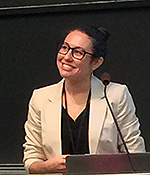 In Fall 2020, Cognitive & Information Sciences welcomes a new Assistant Professor Dr. Rachel Ryskin. We asked Rachel about her background, research and teaching interests, and why she’s excited about UC Merced. See her responses below.
In Fall 2020, Cognitive & Information Sciences welcomes a new Assistant Professor Dr. Rachel Ryskin. We asked Rachel about her background, research and teaching interests, and why she’s excited about UC Merced. See her responses below.
What is your background?
My parents immigrated to the U.S. and I grew up speaking multiple languages: Russian at home with family, English in public, and French at school or with friends. As a result, I was fascinated by how languages shape, and are shaped by, our experiences. In high school, I loved science and biology, and, while in college at Northwestern University, I discovered that I could marry those two interests by studying language through the lens of cognitive science. I started getting lab research experience in college and then was lucky enough to get into a Ph.D. program at the University of Illinois at Urbana-Champaign. After grad school, I was a postdoc at MIT for a few years before coming to UC Merced.
What are your research / scholarship interests?
Language is what allows humans to exchange information, learn from each other, and form lasting relationships. It’s also surprisingly ambiguous (the same set of words can be interpreted in different ways) and the way we use it varies widely across people and situations, which explains why conversational agents, like Siri, have such a hard time understanding us. My research is focused on uncovering how the human language processing system is able to solve this problem by leveraging memory representations to make sophisticated inferences about how the linguistic signal maps to meaning depending on the context of communication.
What are you excited to teach?
I look forward to teaching courses on language and cognition because I find these topics endlessly fascinating, and I get a lot of research ideas from talking to students about them. I’m also looking forward to teaching courses in statistics and methods. Students often think of them as difficult requirements that they have to get through to do the "fun stuff." I’m hoping to show that they are part of the "fun stuff" and learning those skills can give students new insights for their own research.
What drew you to CIS at UC Merced?
The colleagues! I look forward to working alongside, and learning from, students and faculty who are doing fascinating interdisciplinary cognitive science research.



